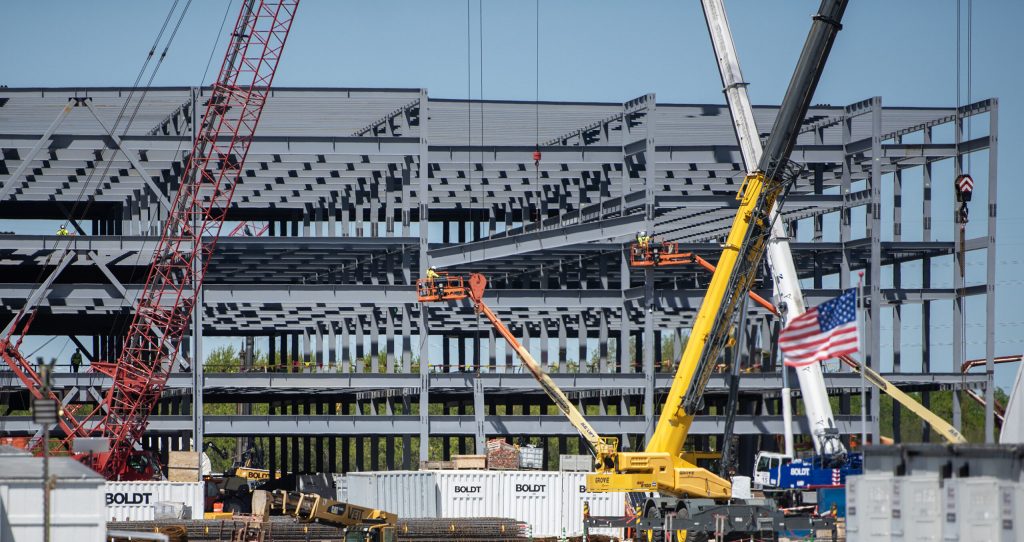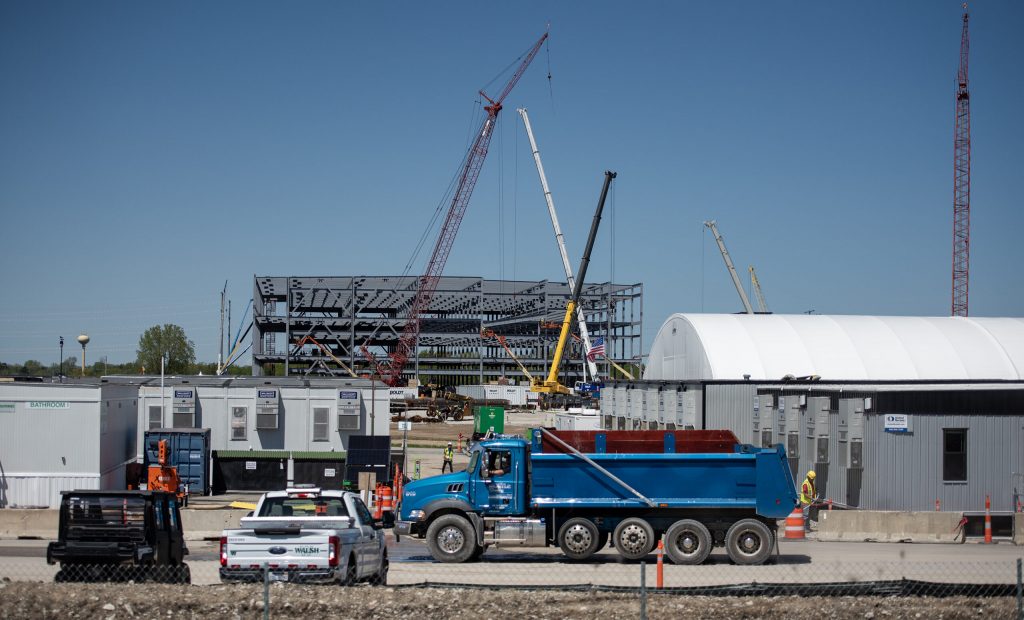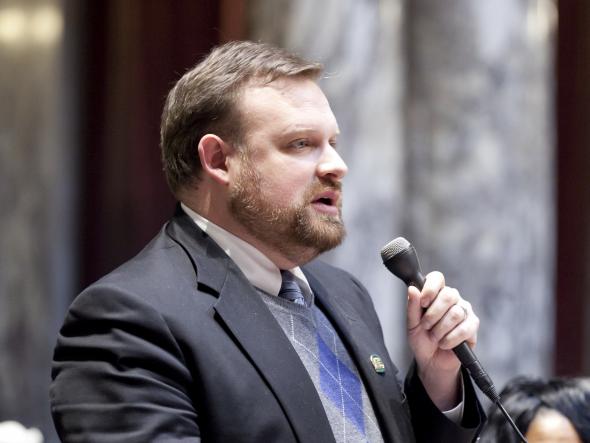Mount Pleasant, Racine in Legal Battle Over Water After Foxconn Failure
Racine mayor says the city didn't get promised benefits, wants new water deal.

An artificial intelligence data center is built on land once slated for development by Foxconn in Mount Pleasant on Wednesday, May 8, 2024, in Mount Pleasant, Wis. Angela Major/WPR
The city of Racine and the village of Mount Pleasant are embroiled in a legal battle over water following the failure of the Foxconn project.
A complaint filed by the village against Racine claims the city has created a “de facto development ban in Mount Pleasant.” The complaint, filed with the Public Service Commission of Wisconsin, said at least five projects have been impacted by the city not approving needed water service extensions for developments.
“Racine’s refusal to permit new water mains in Mount Pleasant to connect to the Racine Water Utility is an unreasonable practice that harms Mount Pleasant,” the complaint states.
Racine has had a water agreement in place with Mount Pleasant since 2004. But in 2018, that agreement was amended to provide water for the tax incremental district on land originally slated for development by Foxconn.
As the years went on, plans for the Foxconn project never came to fruition. In the meantime, Microsoft has announced plans to build data centers in Mount Pleasant. Those plans have been praised by some in the community, but the project will likely include only a fraction of the 13,000 jobs that Foxconn promised the community in 2017.

An artificial intelligence data center is built on land once slated for development by Foxconn in Mount Pleasant on Wednesday, May 8, 2024, in Mount Pleasant, Wis. Angela Major/WPR
In a statement, Racine Mayor Cory Mason said the city has not “received the benefits” that the city had hoped for when Foxconn announced their plans.
Mason said in the statement that the city applied for a diversion exemption for the Great Lakes Compact on the behalf of the village and also “expanded utility services out to the interstate” in the amended water agreement.
“These conditions included the economic benefits that the city would enjoy based upon the significant job projections associated with the Foxconn project,” the statement said.
“The failed Foxconn deal and its empty job promises, combined with changes made to the law and the circumstances around providing water and sewer service to the region, have been devastating for the City of Racine,” the statement added. “Mount Pleasant received the substantial economic benefits of development directly resulting from the city providing water and wastewater service, but fell short on its job promises that would have been enjoyed by the region.”

Racine Mayor Cory Mason was a member of the Wisconsin Assembly from 2007-2018. Photo courtesy of the Wisconsin State Legislature
Mason is seeking to renegotiate the water agreement with the village. In an email, Sean Ryan, communications director for the city of Racine, said the city intends to “continue discussions” with Mount Pleasant officials.
The dispute led Mount Pleasant Village President Dave DeGroot to appear before the Racine Common Council during a public hearing over the summer.
DeGroot said after the water agreement with the city was amended, 14 water projects were approved in the village up until August 2023. Those projects were approved by the Racine Water Works Commission, the Finance and Personnel Committee and then finally by the Racine Common Council.
“We got to a point where I thought maybe you alders aren’t aware of what’s going on here,” DeGroot said during the public hearing.
The Racine Common Council did approve three water main projects in Mount Pleasant during a Sept. 3 meeting, including a project that would benefit the Microsoft development. The Racine Water Works Commission also approved other water extensions in Mount Pleasant during a meeting Tuesday afternoon — those still need to be approved by the common council.
Racine Alder Renee Kelly said she doesn’t believe the city or the mayor has the right to withhold water from projects.
“We don’t have that power. He (Mason) doesn’t have that power,” Kelly said. “What he needs to do is let the legislative process happen.”
DeGroot, who didn’t respond to a reporter’s request for an interview for the story, has said staff from the office of Gov. Tony Evers had reached out to Mason about the dispute. Britt Cudaback, communications director for the office of Gov. Tony Evers, confirmed their office has been in touch with officials.
But discussions are still ongoing between the village and city of Racine. On Sept. 12, Racine and Mount Pleasant agreed to delay the date for Racine’s response to the complaint to Oct. 11, according to a filing with the Public Service Commission of Wisconsin.
Mount Pleasant, Racine facing off in legal battle over water in wake of Foxconn deal was originally published by Wisconsin Public Radio.
If you think stories like this are important, become a member of Urban Milwaukee and help support real, independent journalism. Plus you get some cool added benefits.
More about the Foxconn Facility
- Foxconn Paid Mount Pleasant $15 Million Make-Up Fee in 2025 - Steph Conquest-Ware - Jan 6th, 2026
- Murphy’s Law: Total Cost of Foxconn Is Rising - Bruce Murphy - Dec 8th, 2025
- WEDC, Foxconn announce additional $569 million investment in Racine County - Wisconsin Economic Development Corporation - Nov 25th, 2025
- Foxconn Acquires 20 More Acres in Mount Pleasant, But For What? - Joe Schulz - Jan 7th, 2025
- Murphy’s Law: What Are Foxconn’s Employees Doing? - Bruce Murphy - Dec 17th, 2024
- With 1,114 Employees, Foxconn Earns $9 Million in Tax Credits - Joe Schulz - Dec 13th, 2024
- Mount Pleasant, Racine in Legal Battle Over Water After Foxconn Failure - Evan Casey - Sep 18th, 2024
- Biden Hails ‘Transformative’ Microsoft Project in Mount Pleasant - Sophie Bolich - May 8th, 2024
- Microsoft’s Wisconsin Data Center Now A $3.3 Billion Project - Jeramey Jannene - May 8th, 2024
- We Energies Will Spend $335 Million on Microsoft Development - Evan Casey - Mar 6th, 2024
Read more about Foxconn Facility here





















There is a lot of cheerleading for this project but is it really worth it? Not many jobs created, lots of water and power resources gobbled up by it. (Some excerpts from a JS article)…
Large facilities, like the one Microsoft plans for Mount Pleasant, are known as “hyperscale” in industry terms.
Microsoft said it expects about 300 people to be working at the site by 2026 — a mix of contractors and permanent staff. Most average-size data centers operate with just a few dozen people.
If Microsoft’s new data center uses methods similar to other facilities, it will likely use millions of gallons of water each day, but it’s unclear exactly how much. Foxconn was approved to use 7 million gallons of Lake Michigan water per day “Politicians tend to romanticize the investment,” said Nicolas Diaz, an architect and PhD candidate in Chile, where data centers have proliferated and activist movements have sprung up to oppose them due to their water consumption.
The U.S. Department of Energy says that data centers are energy intensive, using 10 to 50 times the energy per floor space of a typical commercial office building. Microsoft has declined to share how much power the site is projected to use, and information about costs has been kept out of public documents for now.
Despite the electrical infrastructure already extended to the site, there’s more left to be built.
“The devil is in the details,” says Tom Content, executive kdirector of Citizens Utility Board of Wisconsin, and specifics haven’t yet been released. Building new infrastructure could mean cost increases for consumers, says Content.